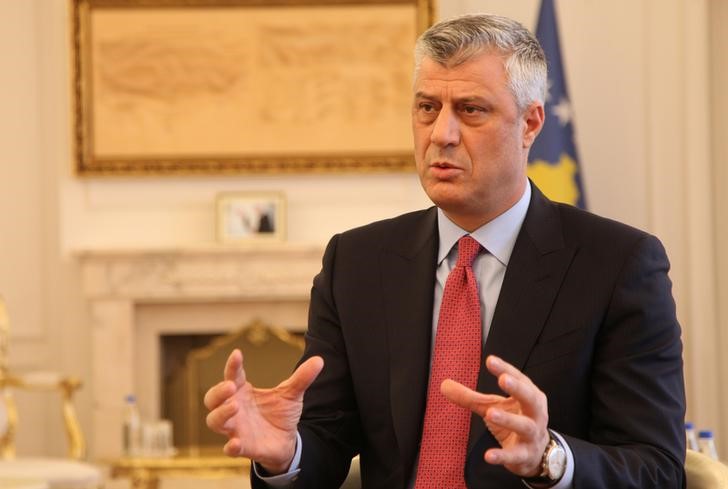By Fatos Bytyci
PRISTINA (Reuters) - Kosovo's president said on Friday he would resign and force a parliamentary election if lawmakers do not approve changes that would effectively create a national army under a plan opposed by the country's ethnic Serb minority and its NATO and U.S. allies.
The Kosovo government ordered the creation of a national army three years ago, but Serbian deputies said they would block the required changes to the constitution.
On Wednesday, parliament indicated it would bypass that opposition by preparing amendments to an existing law that would allow the Kosovo Security Forces (KSF) to buy heavy weapons and recruit more soldiers, in effect transforming it into an army.
The plan drew immediate criticism from NATO, which still has some 4,500 troops in the country nearly two decades after it intervened in a war fought while Kosovo was part of Serbia, and the territory's biggest foreign supporter, the United States.
"If MPs will not vote in favour, I will resign as president that second," President Hashim Thaci, whose former political party is the biggest in parliament, said in an interview on Friday evening with state television channel RTK.
"A legislature that will not vote for the army of its own country should go home."
Kosovo declared independence in 2008 but relations between Belgrade and Pristina remain strained and Serbia continues to regard Europe's newest country as a renegade province.
The row over the army has left the small Balkan country at odds with its western backers over a big issue for the first time and it remains unclear what prompted Thaci to suddenly shift his policy.
NATO and the United States said on Wednesday they would re-evaluate the assistance they have long provided to the KSF if the changes are approved.
In 1999 NATO bombed Serbia for weeks to halt the killing and expulsion from Kosovo of ethnic Albanian civilians by Serbian forces fighting a two-year counter-insurgency. Pristina declared independence almost a decade later with the backing of the United States and Western European countries.
The U.S. ambassador to Kosovo, Greg Delawie, tweeted late on Friday: "The U.S. believes Kosovo's security depends on the quality of its partnerships. We don't want to see Kosovo out of step with key partners."
NATO, whose troops help maintain the fragile peace, said it would prefer that the new republic changes its constitution to create an army.
That would require the support of the 120-seat parliament's 11 Serb deputies, who -- backed by Belgrade -- have said they will never accept the plan to create a force of 5,000 active soldiers and 3,000 reservists.
The KSF is a lightly armed, 2,500-strong force trained by NATO and tasked with crisis response, civil protection and ordinance disposal.
NATO has said it has no plans to leave Kosovo -- a landlocked country of 1.8 million people that borders Serbia, Albania, Montenegro and Macedonia -- but the dispute with key allies over the army has alarmed some.
"The United States is very important for Kosovo and its people," Arben Gashi, a lawmaker from Prime Minister Isa Mustafa's Democratic League of Kosovo (LDK) party said on Friday. "As for Hashim Thaci, he can easily be replaced."
